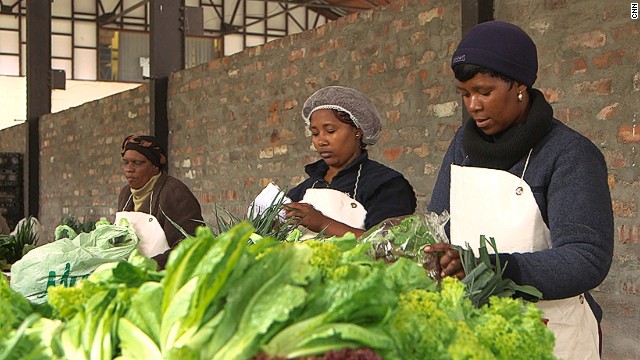
In Cape Town, South Africa, women are growing community urban gardens to sustain themselves, their families, and their communities in the face of food vulnerability. As one woman says, “I had no choice. I had to start farming because I had no money to buy vegetables from the shops. I also realized that if we farmed as a group, we would have more than enough food to eat and that we could generate an income from selling the rest.” Some of this produce grown in the gardens is sold but much of it is used to feed families and add nutrition to family’s diets. These gardens are, in part, a response to the current global food crisis but they’re also part of particular ongoing legacies of racism and apartheid where rural populations were moved to cities.
Maria Suarez, a Costa Rican journalist, who gave a talk in Washington, DC with Just Associates on January 26th, calls rain harvesting and urban community gardens “survival economies” or “care economies” where women improvise, share, generate, develop relationships, draw upon old and new knowledge, to sustain themselves and their families. Women create survival economies in the face of increasing economic inequality and impoverishment and food insecurity. Survival economies are built on women’s relationships with each other, within communities, and are tied, but not directly, to formal economy or formal market systems. Home gardens and rainwater collection does not receive a wage but rather goes directly to women and their families and members of the community. A better term might be women’s survival economies: alternative economic systems where women create ways to survive that are not directly part of market economies in response to pressures from neoliberalism.
The urban gardens are a response to local and global food crisis but they’re created from women’s shared knowledge, and shared labor to make and create their own lives, their family’s and community’s lives, outside of the market economy. In response to Suarez’s talk, someone in the audience asked her how we might find alternative models to the market economy which, in the neoliberal era, has impoverished women and their families. Suarez responded that we need change the ways we see “value”. “Value”, she says, is when our work, or creativity, and our lives are turned into money. In a market economy, only things that can be turned into money are “valuable,” anything else (like household work or raising children, garden growing, or any work is that is unwaged) is not “valuable.” When our dominant economic and discursive models see “value” as just money or markets or waged labor, we don’t value (in the other meaning of value which is to find something worthwhile or meaningful) economic structures and relationships that women live by. In this context, we might also note with William Aal, Lucy Jarosz, and Carol Thompson that in the context of the global food crisis and the inefficiency of commercial production, “small-scale urban agriculture in the form of community gardening is becoming increasingly important in seasonal food supplies and local forms of food security.”
Aal, Jarosz, and Thompson also point out that in predominant analysis of the global food crisis, women’s voices are not sought out or valued. As they argue, “The barefoot woman bending over her cultivated genetic treasure is not ‘scientific’, even though such farmers have cultivated genetic biodiversity over thousands of years. These free gifts do not fit into the corporate logic behind commercial agriculture, where only profit can be an incentive, not curiosity nor sharing. Yet indigenous knowledge provides us with all our current food diversity and is the basis for 70 per cent of our current medicines. Americans, for example, need to know that every major food crop we use today was given to us by Native Americans. In contrast, commercial agriculture makes a profit by depleting the gene pool, the result of valuing only very specific traits” What would it mean to talk about how urban space is used in the context of the global food crisis and women in the same paragraph? What would it mean to value women’s knowledge, women’s ingenuity, women’s labor, and, women’s lives?
Activist and eco-feminist Vandana Shiva writes about women in India who over generations have developed knowledge of seed diversity. Shiva advocates an approach to the food crisis that values the experience and knowledge of women. The values – the ethics that women live by and, also, the different relationships to survival, for themselves and for their families – that women have developed that are outside dominant language and mechanisms of market economy. The independence, creativity, and shared knowledge that women have are, Shiva says, something worth preserving. In response to corporate efforts to patent seed knowledge that women have developed in India, Shiva says: “We will never compromise on this great civilization, which has been based on the culture of sharing the abundance of the world and will continue to maintain this trend of sharing our biodiversity and knowledge. We will never allow your culture of impoverishment and greed to undermine our culture of abundance and sharing.”
(Photo Credit: CNN)